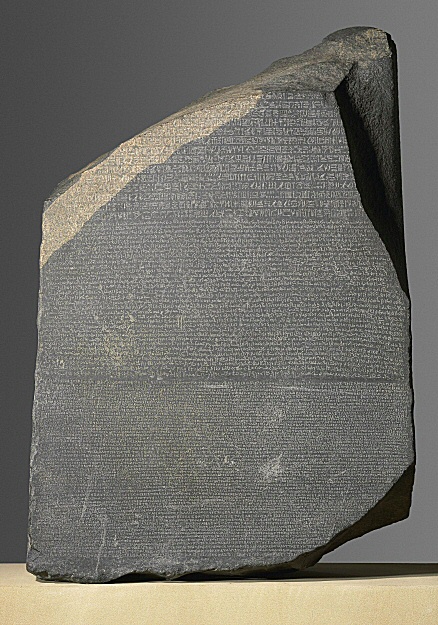The Rosetta Stone Online project
This homepage is the outcome of a hands-on university seminar on the digital online presentation of the Rosetta Stone. It is a cooperation of the German Excellence Cluster Topoi and the Department of Archaeology of the Humboldt-Universität zu Berlin. For this project, the project leaders and the seminar participants combined their expertise in Egyptology, Ancient Greek Linguistics, General Linguistics, and Computer Sciences. A kernel part of the homepage is a full linguistic analysis of the trilingual text on the Rosetta Stone. However, it also seeks to present interesting information for a non-academic reader. The homepage is still under development.
The Rosetta Stone
On the Rosetta Stone, an Ancient Egyptian decree from 196 BCE was inscribed in three versions, in three language varieties and scripts:
- Ptolemaic Neo-Middle Egyptian in hieroglyphic script (top section),
- Demotic Egyptian in Demotic script (middle section),
- Koine Greek language in Greek script (bottom section).
This type of artefact is called a trilingual. The Rosetta Stone played a crucial role in the famous decipherment of the hieroglyphic script by Jean-François Champollion (see the BBC documentary The Mystery of the Rosetta Stone).
Parallel sections on the Rosetta Stone
Move the mouse over the image to highlight parallel sections.
Klick to go to its linguistic analysis.

The Rosetta Stone (© Trustees of the British Museum, CC-BY-NC-SA)
What does this homepage provide?
The Rosetta Stone Online homepage provides a multi-layered annotation of the spellings and the words of the trilingual inscription. Depending on the script, we provide a set of the following layers:
- Original spelling,
- Analysis of sign functions (Egyptian hieroglyphs only),
- Traditional transliteration,
- Modern transliteration plus linguistic Interlinear Morphemic Glossing (cf. the Wiki Glossing Ancient Languages),
- Links to the online dictionaries Thesaurus Linguae Aegyptiae and Thesaurus Linguae Graecae,
- Simple word-by-word translations (English and German),
- Sentence translation(s) (English and German).

Klick here for an EXAMPLE.
We are happy to receive your comments on the homepage or on specific analyses. Please use the respective commentary fields.
